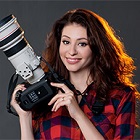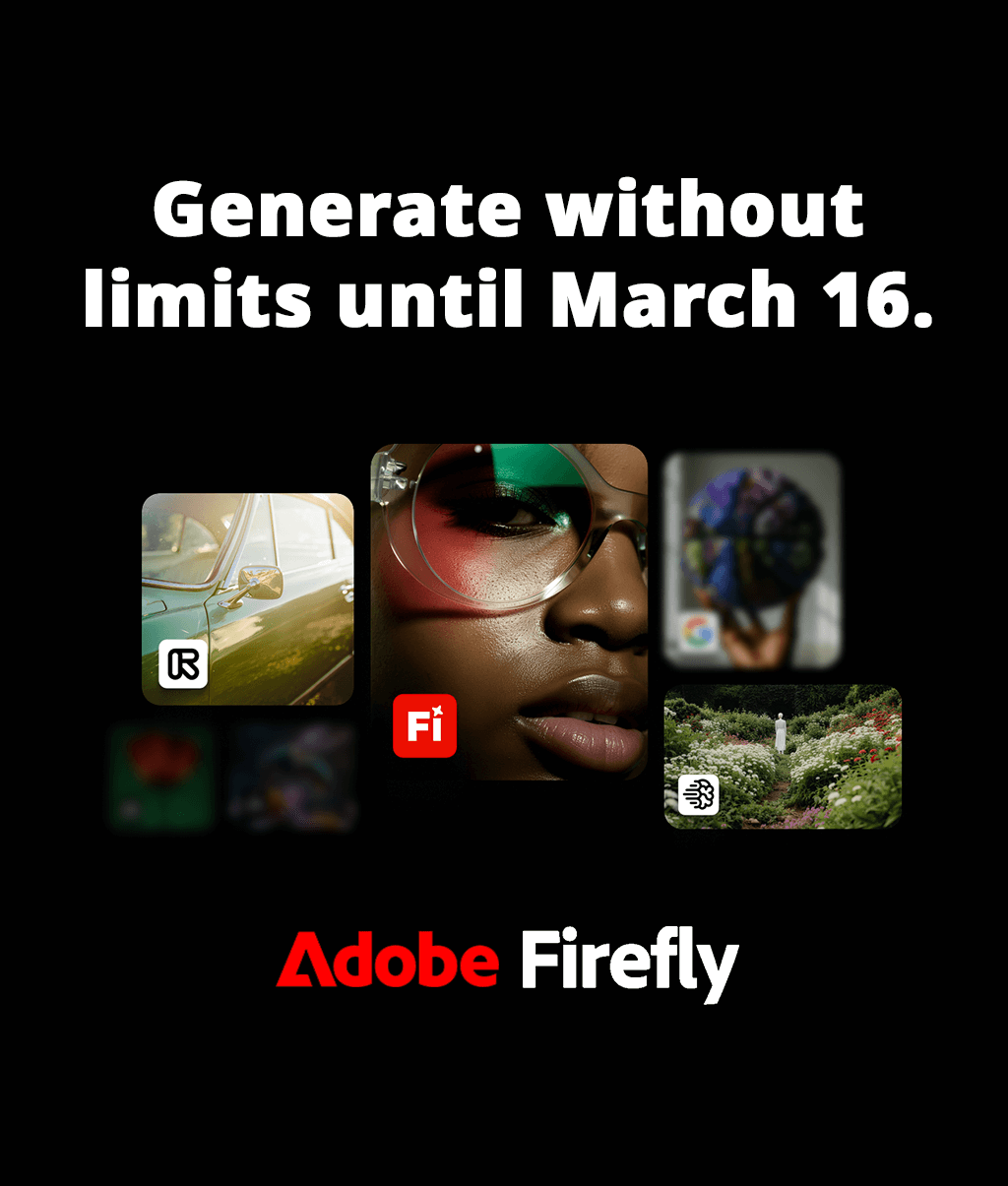10 Best Light Meters for Photography in 2026
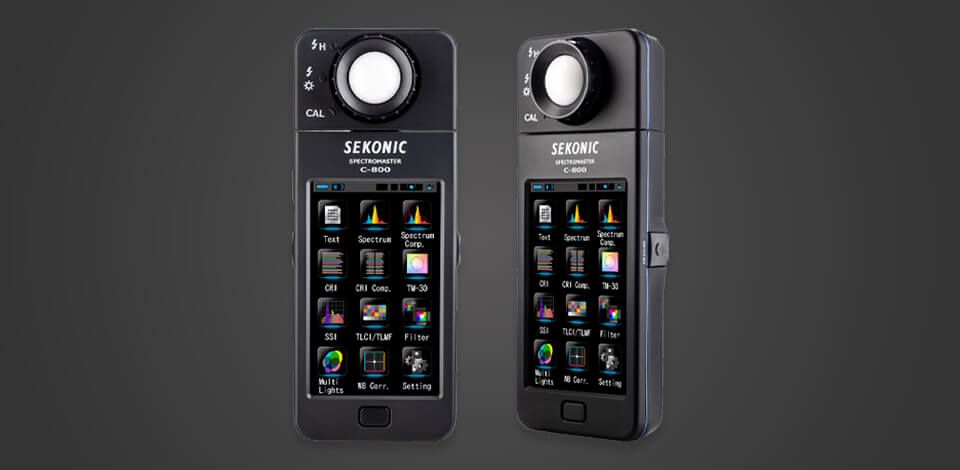
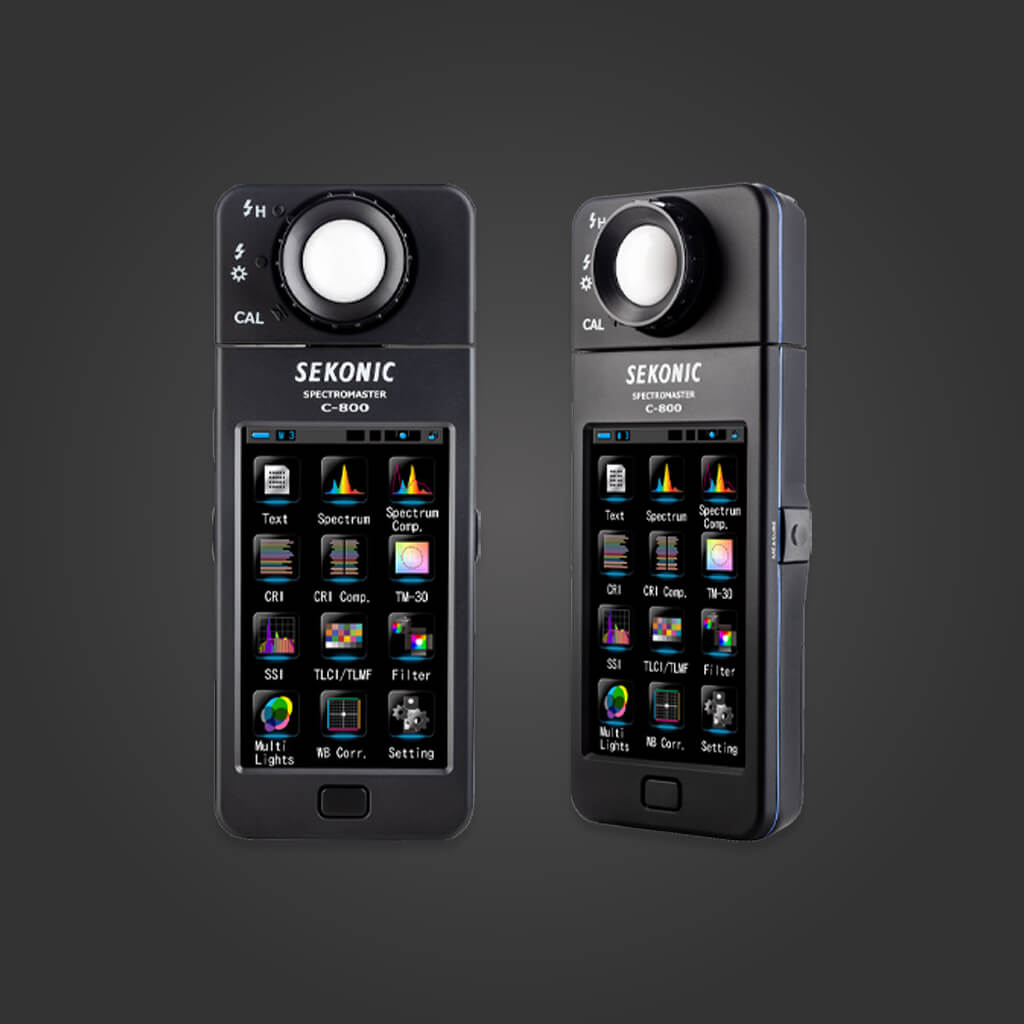
Unlike built-in camera meters (TTL), a light meter (H-H LM) can measure incident and reflected light even with the narrowest fields of view (sometimes as low as 1 degree). Moreover, some of light meter types provide continuous exposure, so that you can see how the lighting changes depending on the location.
Based on my personal experience and reviews left by professional photographers, I made my own top 10 best light meters’ list, evaluating the accuracy, sensitivity, and ease of use of each light meter.
1. Sekonic LiteMaster Pro L-478DR-U
FixThePhoto editors’ choice
Metering methods: incident and reflected light | Ambient range: incident light – from EV – 2 to 22.9; reflected light – from EV 3 to 19.9 | Flash range: incident light – from F 1.0 to F 128.9; reflected light – from F 2.8 to F 128.9 | Screen type: 2.7" LCD touchscreen | Battery: 2 АAA batteries
VIEW IN AMAZON

⊕ Suitable for photos and video
⊕ 2,7” LCD touchscreen
⊕ Flash-analysis function
⊕ PocketWizard ControlTL technology
⊖ No flaws found
One of the most distinguishing features of the Sekonic LiteMaster Pro L-478DR-U is its large 2.7” touchscreen that provides simple controls. Despite being 5-years old, this Sekonic light meter can work in the -2 to 22.9 EV range at ISO 100, which is still more than enough today.
Other than a traditional LED light meter for photography, Sekonic LiteMaster Pro L-478DR-U can also be used for video recording thanks to such modes as Cine and HD Cine, which allow you to set shutter angles from 1 to 358 degrees and a framerate from 1 to 1000 fps. I should also note the PocketWizard ControlTL technology, which combines light measuring with flash power control on a distance of up to 100 feet.
- Choose the right about studio lighting kit.
2. Sekonic Speedmaster L-858D-U
Best light meter for studio photography
Metering methods: incident and reflected light | Ambient range: incident light – from EV -5 to EV 22.9; reflected light – from EV -1 to EV 24.4 | Flash range: incident light – from F 0.5 to F 161.2; reflected light – from F 1 to F 161.2 | Screen type: 2.7" LCD touchscreen | Battery: 2 АAA batteries
VIEW IN AMAZON

⊕ Improved sensitivity
⊕ Integrated set of movie modes
⊕ Accurate flash controls
⊖ Quite expensive
Sekonic Speedmaster L-858D-U is the premier multifunctional wireless lux meter for LED that can also be used for triggering. It has a 2.7” color LCD touchscreen. The improved sensitivity allows recording measurements with luminance starting at a mere 0.1 lux, and using the expanded range from -5 to 22.9 EV for incident light measurements and from -1 to 22.4 EV for reflected light.
Sekonic Speedmaster L-858D-U is supplied with three photosensitivity levels that are perfect for incident lighting. I should also mention the flash duration measurement mode that allows capturing scenes, where you’re freezing a fast-moving object like water.
You’ll also like such functions as HSS flash measurements and flash analysis (used for illuminating shadows and reducing the background’s level of detail), which make this model arguably the best light meter for photography.
- Read more about the best reflector boards.
3. Sekonic C-700R-U
Best light meter for changing color temperature
Metering methods: all types of light | Ambient range: from 1 to 200 000 Lux | Flash range: from 20 to 20 480 Lux | Screen type: 4.3" LCD touchscreen | Battery: 2 АAA batteries
VIEW IN AMAZON

⊕ Measures light from all types of sources
⊕ PocketWizard wireless connectivity
⊕ High-resolution CMOS sensor
⊖ Large LCD screen can be fragile
⊖ Too expensive for everyday use
The ability to measure light regardless of the source type, be it natural light, HMI, fluorescent lamps, a plasm or tungsten lamp, a digital flash, a light bulb or LED flash – this is an aspect in which Sekonic C-700R-U has no equals and stands above other best light meters. The C-700R-U is $200 more expensive than the C-700-U but offers a wireless PocketWizard connection option.
Its touchscreen display makes navigating various modes and functions easier, including real-time lighting comparisons and spectral distribution. You can view this information in graph form. The high-resolution measurement system with a CMOS sensor allows recording light source peaks, providing unparalleled accuracy in lighting measuring.
It’s capable of measuring the amount of surrounding light in the 1.0 to 200 000 lux range and color temperature in the 1600 to 40000 K range, making it the best lux meter on the market.
- Learn more about the best camera for photography.
4. Gossen Digipro F2
Best light meter for street
Metering methods: incident and reflected light | Ambient range: EV -3 to EV 21| Flash range: F 1.0 to F 115 | Screen type: 2.7" LCD screen | Battery: 1 АA battery
VIEW IN AMAZON

⊕ Rotatable head
⊕ Intuitive digital interface
⊕ Several flash measurements
⊖ Model wasn’t updated for a long time
⊖ Wireless connection can suffer from disruptions
Gossen Digipro F2 is a digital lightmeter for beginners and suitable both for studio and street use. The developers managed to create an ergonomic design by making the body lightweight and small and supplying it with a rotatable head.
The Digipro F2 uses a large screen with easily readable letters that measure flash and ambiance lighting. It displays exposure values in ½ or 1/3 increments, digital measurements in 1/10 increments, and analog contrast indicators in ½ stop increments.
The exposure meter has a built-in analog contrast control function and individualized adaptation technology. Other than that, the Digipro F2 analog light meter comes with separate shutter speed and shutter priority modes, and a large range of framerates for video makers, including 25 and 30 fps modes. It can show exposure time from 1/8000 of a second to 60 minutes and synchronize with your flash with a speed from 1 to 1/1000 of a second.
- View the about best camera remotes to prevent camera shake.
5. Kenko KFM-2200
Best light meter for incident and reflected light
Metering methods: incident and reflected light | Ambient range: incident light from –2.0 to 19.9 EV; spot meter – from 2.0 to 24.5 EV | Flash range: incident light from F 1.0 to F 128 + 0.9 stop; spot meter – from F 2.8 to F 128 + 0.9 stop| Screen type: 1.2" LCD screen | Battery: 1 АA battery
VIEW IN AMAZON

⊕ Framerate from 2 to 360
⊕ Flash Metering and Sync Terminal
⊕ Measures incident and reflected light
⊖ Design may seem outdated
⊖ Expensive for the offered functionality
Just like the Sekonic Speedmaster L-858D-U, Kenko KFM-2200 is capable of measuring both incident and reflected lighting, including flash and strobe lights. There’s also a special N-CORD mode designed for incident light that can flash without having to use a synchronization cable.
The compact body is supplied with a spherical diffuser that can be rotated up to 270o and receive accurate readings. According to several light meter reviews, the biggest advantage of this meter is that you can use it as both a flash and an accurate exposure meter without having to switch between two different devices.
This incident light meter offers a large selection of shutter speed settings from 1/6000 of a second to 30 minutes with a framerate from 2 to 360. I can also note the large range of shutter stops from f/1.0 to f/128. The built-in memory allows storing up to 10 measured values.
- Check out the best photo editing software for PC.
6. Sekonic L-308S-U
Best compact LED light meter
Metering methods: incident and reflected light | Ambient range: incident light – from 0 to 19.9 EV; reflected light – from 0 to 19.9 EV | Flash range: incident light – from F 1.4 to F 90 + 0.9 stop; reflected light – from F 1.4 to F 90 + 0.9 stop | Screen type: 0.9" LCD screen | Battery: 1 АAA battery
VIEW IN AMAZON

⊕ Pocket size
⊕ Wireless flash option works on a single AA battery
⊕ 180 degrees’ shutter angle
⊖ Battery charge doesn’t last long
⊖ Doesn’t work as a remote trigger
Sekonic L-308S0U is a sufficiently functional pocket digital lightmeter capable of measuring incident and reflected light. You can always carry it with you, regardless of the shooting conditions. It offers high precision of up to tenths of a stop for both ambiance and digital flash readings with the help of a small lens at an angle of 40o.
When using the flash meter mode, you have 90 seconds for manual measurement (on average, this value fluctuates around 60 sec.). Sekonic L-308S-U can also show the aperture and shutter speed values to reflect the exposure settings of your camera.
Despite its small size, the device has an adequate measuring range and such advanced functions like the ability to read ambient and flash lights in both incident and reflecting modes. The framerate range from 8 to 128 frames per second and a shutter angle of 180o makes Sekonic L-308S-U one of the best light meters for cinematography in its class.
7. Gossen Digisky Digital GO 4039
May cause flashes from Broncolor, Elinchrom and Phottix
Metering methods: incident and reflected light | Ambient range: EV 15 in 1/10 increments | Flash range: f/0.5 to f/128 | Screen type: 2.2" TFT-LCD | Battery: Not required
VIEW IN AMAZON

⊕ Memory function
⊕ Up-to-date design
⊕ Embedded rechargeable battery
⊖ Overcomplicated interface may be confusing
Gossen Digisky Digital GO 4039 is a perfect tool for shooters looking for flexibility and precision of performance. Aesthetes are attracted by a 2.2-inch TFT-screen, operating ring controller and glossy plastic body.
Moreover, DIGISKY may be called one of the best light meters thanks to its capability to cause triggering flashes from Broncolor, Elinchrom and Phottix.
All measurements may be indicated in full, 1/2 or 1/3 f-stops. An embedded distance radio-trigger Sky Port eliminates the need in cables to activate the studio flash. HDR photographers will like the possibility of metering contrast and illumination of the object.
8. Sekonic L-398A
Best light meter without a battery
Metering method: incident and reflected light | Ambient range: incident light ‒ from EV 4 to 17, reflected light ‒ from EV 9 to 17| Flash range: f/0.7 to f/128 | Screen type: No Display | Battery: Not required
VIEW IN AMAZON

⊕ Requires no battery
⊕ Rotating head and the needle
⊕ Photocell is made of amorphic silicon
⊖ Expensive for such a model
⊖ Analog light meter
If you are tired of carrying a pile of AA batteries, Sekonic L-398A will become an ideal option for you. This classic exposure meter is fully analog, uses a dial and needle but not buttons and the digital screen.
Since it is fully an analog light meter, you should understand that there isn’t any integration with the flash or other connections. Sekonic L-398A is created specifically for spot and outer measurements. For these purposes, the lumidisc is available. It will enable you to control contrast and meter lighting intensity. To meter the reflected light, you may use the lumigrid. This tool is suitable to cope with outdoor photo sessions featuring ISO between 6 and 12,000 (with a 1/3 f-stops) and from f/0.7 to f/128.
9. Sekonic L-208
Best budget led light meter
Metering method: incident and reflected light | Ambient range: EV 3 to EV 17 | Flash range: f /1.4 to f / 32 in half-stop intervals | Screen type: No Display | Battery: 1 Lithium Metal batteries
VIEW IN AMAZON

⊕ Low price
⊕ Hold-and-read function
⊕ Lightweight
⊖ No integration with a flash
⊖ Analog light meter
If you are a beginner or have recently switched to film photography, this Sekonic light meter is the best variant for you. Moreover, it isn’t expensive. Sekonic L-208 is developed according to the same principle as L-398A ‒ for manual metering of the incident and reflected light.
For convenient usage, you may install the light meter on the camera or tripod. It is ideally suitable as a basic meter for an amateur or experienced shooter as well as a spare one for a professional photographer.
Due to its cheap price, the meter range is not as high as expensive models offer but it is still capable of supporting exposure from 1/8000 to 30 seconds, f/1.4 to f/32 in half-stop intervals and ISOs between 12 and 12500.
The sliding lumisphere provides precise incident indicators. A silicone photodiode receives light at an angle of 33 degrees, which is slightly worse than the angle of the simple lens. Thanks to a hold-and-read function, you may adjust the settings for 15 seconds after you have released the measurement button.
- Choose the best camera for amateur photography.
10. Gossen Digisix 2
Best light meter for beginners
Metering method: incident and reflected light | Ambient range: EV 0 – 18 | Flash range: f/2 – f/32 | Screen type: 0.6" digital display | Battery: 1 Lithium Metal batteries
VIEW IN AMAZON

⊕ Meters incident and reflected light
⊕ Easy to use
⊖ Not suitable for professional photo sessions
⊖ Expensive considering functions it offers
Gossen Digisix 2 is a lightweight (only 1.4 oz), digital lightmeter with analog settings for outer lighting. Using this tool, you may expand the measuring options of manually adjusted cameras, including incident light measurement. In such a way, it is possible to achieve better exposure to create extraordinary subject contrast.
This light meter boasts of many useful functions, including thermometer of the environment which may be adjusted for Celsius or Fahrenheit degrees, timer for measurements from 1 second to 30 minutes and the clock (adjustable to show time in 12 or 24-hour format).
Top Best Light Meters
| Image | Name | Features | |
|---|---|---|---|
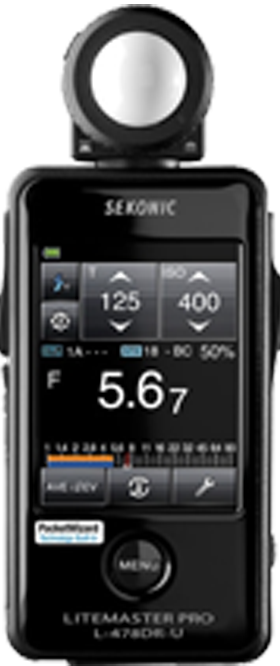 |
Sekonic LiteMaster Pro L-478DR-U
OUR CHOICE |
Check PRICE → | |
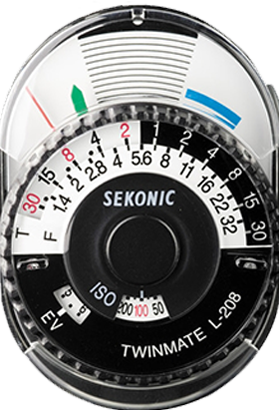 |
Sekonic L-208
BUDGET |
Check PRICE → | |
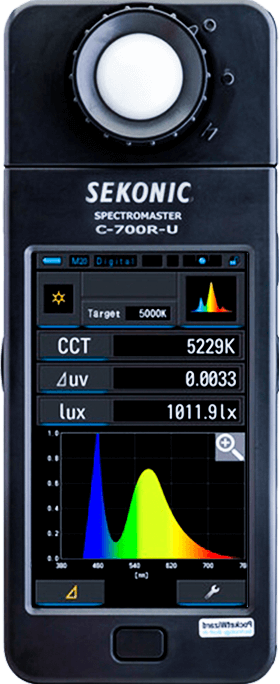 |
Sekonic C-700R-U
HIGH-QUALITY |
Check PRICE → |
How to Choose the Best Light Meter?
All light meter models described above offer a good value for money. But if you are not focused on one particular light meter and want to consider other models, use my notes presented below.
- The model of good quality has two measurement modes: flash and reflection. Expensive models also feature the incident mode ‒ it is used in cinematography.
- The light meter should read at an angle of 1 degree for easy control over an object at any distance.
- The gadget should also be capable of launching a studio strobe light if you use a flash.
- The best light meter should be able to record several data from one or several stroboscopic blocks.
- The object-finder of the light meter should reflect exposure values, which may be viewed on the outer LCD display.
Best Light Meter App
Pocket Light Meter
Best light meter app for iPhone
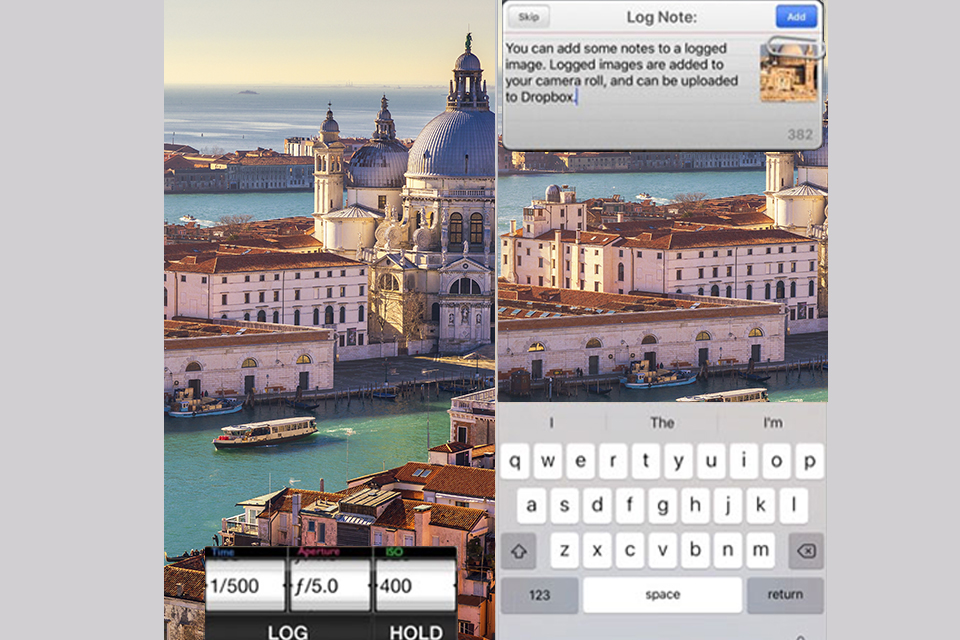
iOS V9.0 or later
Pocket Light Meter is a paid mobile app capable of metering reflected light and calculating reciprocity. The interface is very simple. This app uses the phone camera to reflect and meter the reflected light. In default, you see all the details of the scene. But if you touch any detail on the screen, the display will switch to a spot measurement.
The app offers settings for exposure time, ISO and aperture. You may lock down some of them (for example, if you shoot with a film camera with fixed ISO) while other settings will be changed to compensate it. Among other useful functions, I can note a holding button which saves the current settings when the camera/object is moved. Moreover, the app allows shooting images indicating geo-data and any other notes.
Lux Meter
Best light meter app for Android
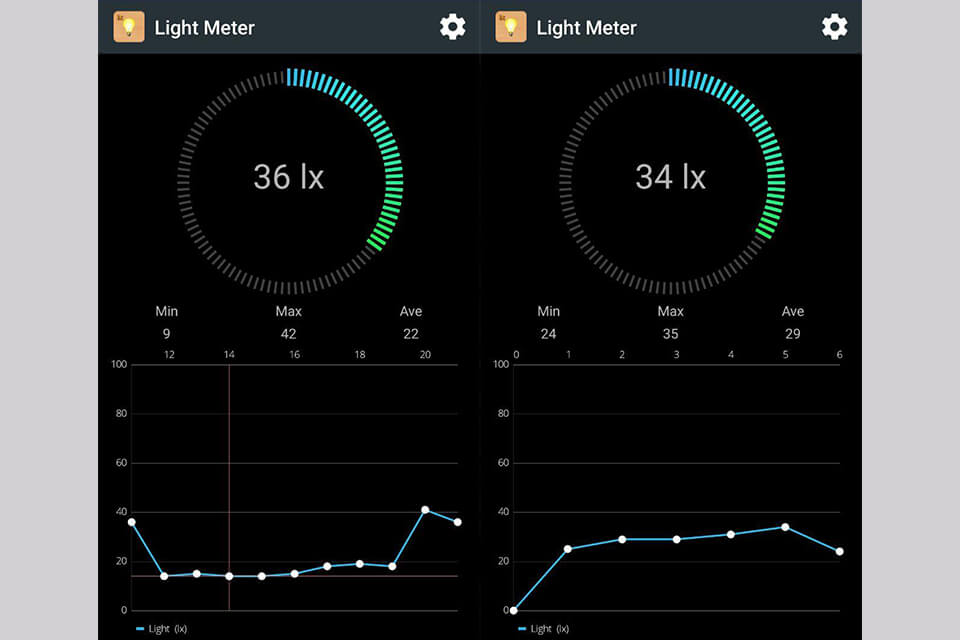
Android V4.2 or later
Price: Free
Unlike Pocket Light Meter, Lux Meter for Android is completely free. It meters light using the light sensor of your gadget. The interface is very simple, without unnecessary elements. One graph, a measuring ring and some additional settings are available.
The app is necessary while using a manual or film camera. Therefore, there is no need to buy expensive tools that usually cost hundreds of dollars.
Although Lux may be called the best light meter app for Android, some disadvantages still exist. For example, many users complain that lags and crashes occur quite often.

































